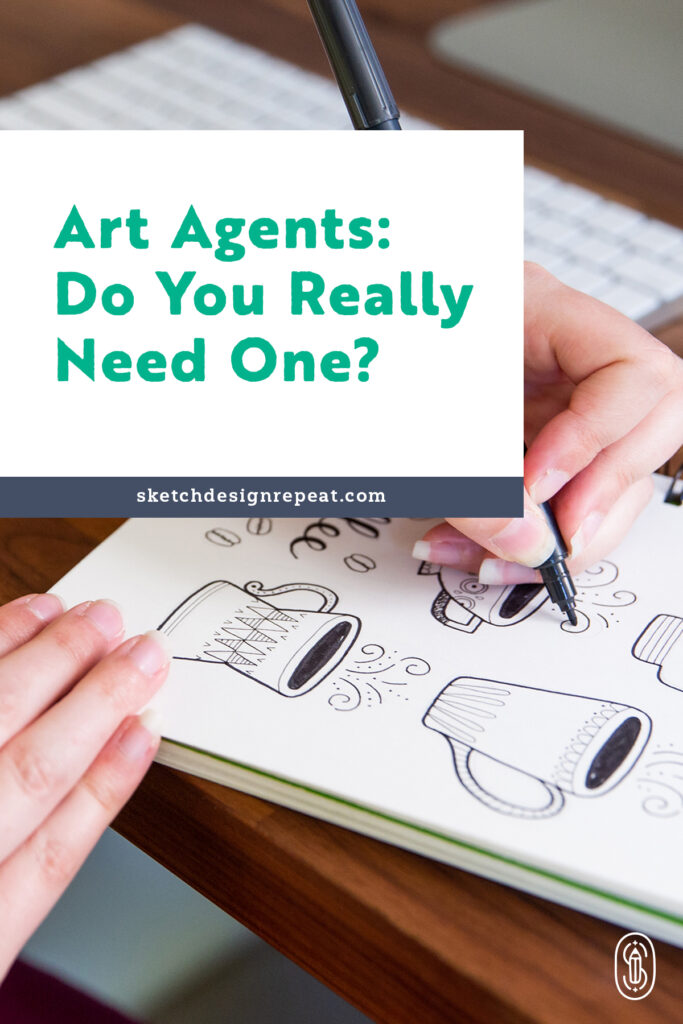I see many artists seeking representation from an agent, and it’s easy to understand why.
Surprisingly though, having an agent is not the secret to success that many artists expect it to be and it’s important to be aware of the pros and cons before signing a contract that might not serve you well in the long run.
In this post, we will look in some detail at the pros and cons of having an agent. I will give you some tips on finding the right agent for you and some final words of advice.

The pros of having an agent
Art agents are professionals who represent artists, illustrators, and designers to help them sell or license their work to the right client. They will also negotiate on behalf of the artist or designer when it comes to pricing, royalties, and contracts.
There are many reasons why you might want an agent but the three most common benefits I see for artists are:
1. The agent’s industry knowledge & connections
2. Handing over many administrative tasks
3. Avoiding emotional discomfort
Industry knowledge & connections
It can be hard as a self employed artist to get started in the world of art licensing because you don’t yet have any contacts in the industry or any experience dealing with clients or negotiating pricing and contracts. This can be a big hurdle to overcome by yourself.
However, you need to know that it’s perfectly possible (even agents start somewhere) and there are now many online classes to help you, including Artful Pricing & Negotiation.
Agents already have these industry connections to get your work in front of the right people. They will have lists of known clients (and potential new clients) to reach out to on your behalf, meaning you don’t need to spend time building your own list and searching for the right contact information. Agents are also likely to know what sort of new artwork each client might be looking for at any particular time, which means emails can be more targeted.
They can also provide you with appropriate art direction for different clients. If an agent is familiar with what repeat clients are looking for, they can offer advice on preferred styles, subject matter, colors, and so on. This can help you as the artist to create more marketable and appealing work for clients.
Related Article: The Secret to a Long Term Career in Surface Design
Agents can help the artist negotiate pricing and contracts. This is an especially tricky aspect for artists who are just starting out and may not be familiar with the industry standards for pay, royalties, and contract terms — although the Surface Design Industry Survey can give you some great insights on that. But an experienced agent can make sure that an artist gets a fair deal from a potential client, whereas new artists working alone are easier to take advantage of.

Administrative work
Agents can help artists avoid many administrative tasks. Let’s face it, most of us would rather be creating new artwork than sending emails, negotiating contracts, responding to multiple queries, and chasing payments. The administrative side of our business can be very time-consuming. Having an agent handle these tasks frees up artists to focus on creating new work.
Emotional discomfort
I believe this is a bigger problem than many would like to admit, but it’s why many artists can get stuck obsessing over tiny practical problems, instead of doing something uncomfortable that moves them forwards.
The discomfort of doing something new is very real and completely natural.
Reaching out to clients you don’t know and anticipating their inevitable rejections is enough to freeze many artists into total inaction. Having an agent helps you to avoid all this discomfort. Having said that, doing anything new is always scary and it’s not good to let that fear make important decisions for you in your business.
The cons of having an agent
The three biggest downsides to having an agent are:
1. Agency fees
2. Agent contracts
3. Conflicts of interest
Agency fees
This is the biggest and most obvious downside to having an agent. Whilst an agent can really benefit your art career, you have to pay for it… and it’s not cheap.
Agents take a percentage of the artist’s earnings from each sale or licensing deal as a commission, typically around 40–50%. This means that the artist will have less money to pocket from each sale, which can really add up over time. Think about the additional money you would have earned if you had found this deal by yourself, and then decide whether it’s worth it for you.
Some agents and agencies also charge high annual fees. These fees can be between $1,000 – $3,500 per year (on top of the agent’s commission) which is a significant expense for an artist. Those who are just starting out could end up losing money overall if they don’t earn enough in the year to cover this fee.
Having an agent is like outsourcing a job to someone more qualified, and you want to make sure that you get what you pay for. Is it worth giving up (potentially) half or more of your income to save time on administrative tasks and benefit from their connections and expertise? The reality is that you might earn more without an agent.
Tough contracts
All reputable agents will require artists to sign a contract with them, which you must read very carefully so you fully understand the terms of the agreement. A good contract should set out the expectations for both the agent and the artist, so be very wary of contracts that only benefit and protect the agency. This should be a two-way arrangement that benefits both parties.
Most agents require exclusivity with their clients, and many require exclusivity on all commercial sales and licenses whilst you are under contract. This means that artists can only work with clients that have gone via the agent, which potentially limits the number of available opportunities. It also means paying your agent a commission on jobs where the client contacted you directly, and the agent actually had very little input. Having said that, agent involvement can also act as a safety net, preventing you from wasting time on low-paying clients.

Some agencies will also require you to create a certain number of designs each month.
While this is usually flexible, there might still be an expectation of a high output, which will restrict the time you have available to pursue other things in life and business. It’s something to consider carefully to avoid overwhelm.
There should also be a release clause in every contract that will have certain limitations on the artist if they wish to leave the agency. Any current client contracts must be concluded with the usual fees being paid to the agency, which is to be expected. There is also likely to be a set period of time (six months is common) that must be served before an artist can seek alternative representation or make new deals with commercial clients. Make sure to read this carefully to ensure you don’t get stuck in a situation where you can’t leave your agent.
Conflicts of interest
An agent’s primary goal is to get successful licensing deals or sales for their artists and to find appropriate artwork for their clients. This is great, but it can mean they’re not nurturing the artist in the direction they want to go creatively. You will be expected to adapt your style to suit your client’s needs, so if your goal is to be an artist with a signature style, agencies aren’t always the best place to develop it. In fact, agents often prefer artists who can adapt to a variety of different styles to suit multiple clients.
Sometimes your agent might negotiate a deal on your behalf that you’re not excited about. If they fail to consult their artists before finalizing an agreement with a client, you might be obligated to work on a commission for less money than you’re happy with, do a project you don’t want to be involved with, or sell some work for a lower price than you feel it deserved. Unfortunately, once an agreement has been made on your behalf, you are likely to be bound by it.
And while there will be clients who seek out agencies to work with, some might dislike working with agents because they perceive it to be more intimidating, time-consuming, or expensive than dealing directly with an artist.
Related Article: Email Pitching Tips from a Former Art Buyer
Tips for finding the right agent
Ultimately, the decision of whether or not to seek out and sign with an art agent is up to you as a self-employed artist. If you decide that you do want representation, you must do your research before applying. All agents and agencies work differently and it’s important to find one that is a good fit for you.
Make sure your art is a good fit by looking at the other artists represented by the agency and making sure that your art offers something new, while also being a good fit for their brand. Agents need to offer their clients a variety of work so they won’t take on someone whose work looks the same as one of their existing artists.
Look at the type of markets that the agency serves to decide whether your work will suit their clients. There is no point in applying to an agency that specializes in children’s book illustration if you only create repeat patterns. What are their clients looking for and do you have something new and relevant to offer?
You need to like and trust your agent. You never want to be working with someone you don’t respect professionally, and be aware that your reputation will be tied to your agent’s behavior, so make sure you are happy with how they communicate. It’s also important to have a good rapport with your agent and feel like they’re someone you can trust.
Decide whether you want to work with a small boutique agency (often with just one solo agent) or a large agency with multiple agents. There are pros and cons to both. A solo agent will likely give more individual attention to their artists, but might also have a smaller client list.
Connect with the agency’s existing artists and ask them questions about their experience. Not everyone will reply, but some will be open to telling you more and it’s the best way to get a feel for what it would be like working with that agency. It’s also beneficial to reach out to those who’ve left the agency as it can give you a more well rounded perspective.
But don’t wait to get an agent before reaching out to clients by yourself.
Too many new artists get stuck thinking that an agent is the only way forward for them, and they make no progress. Having an existing list of clients will actually make you more appealing to agents as you now have proof that companies want your work. Agents will usually let you keep your existing clients without taking any commission in the future, so building that client list in advance will only benefit you.
If you are offered representation by an agency, make sure you read the contract very carefully before signing. It might be worth getting legal advice at this point if you are uncertain of anything. If it doesn’t work out, you want to make sure you can afford to leave.
Finally, this is a two-way arrangement. Remember to ask the agency questions to make sure they are going to work for you, too.
Final words of advice
While an agent can be a very helpful addition to an artist’s career, it is not a guarantee of success or any income level. Some artists have left agencies because they didn’t make enough money, and have found much more success going solo.
It’s important to weigh the pros and cons of having an agent before making a decision and ultimately it’s up to you to decide whether or not to seek representation.
Finally, to answer the title question; no, you do not need an agent. It is absolutely possible to have a successful and lucrative freelance art career without one.

Written by Bex Morley
Website: www.bexmorley.com
Instagram: @bex.morley
Bex is a British illustrator, pattern designer and business coach living on Vancouver Island. She sells and licenses her designs to fabric, stationery & home decor manufacturers all over the world. She also coaches, and loves to help others succeed in their creative business goals.
Hmmm.. this article made me rethink wanting an agent, yet I’m not good at all at finding clients!
This has a lot of great information.
Thank you so much! I am starting to pitch and feeling a little intimidated.
Thanks again!
Suzanne
do an artist agents requires to take any license for acting as an agent
There are no certifications for art agents – most start out as art directors or artists, which is where they gather their experience necessary to be an agent.